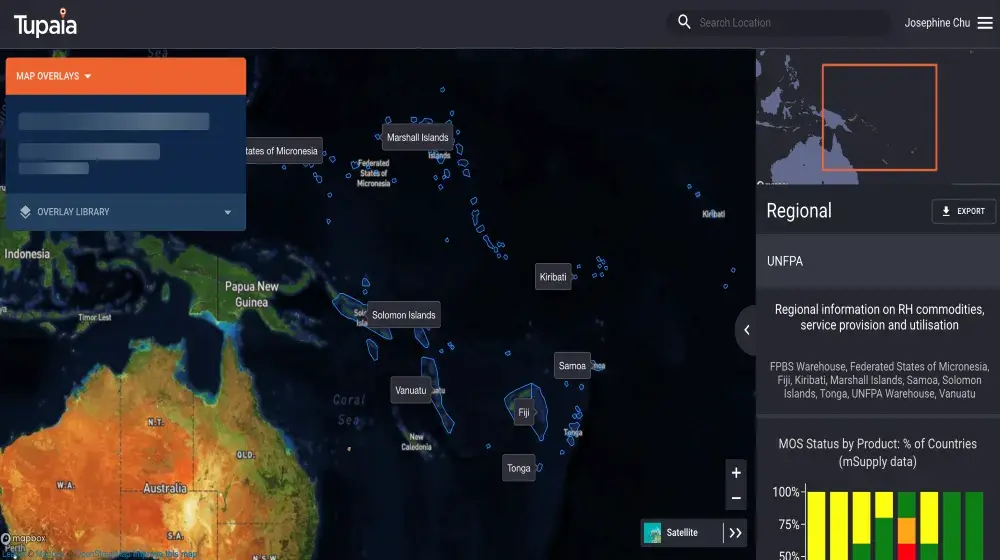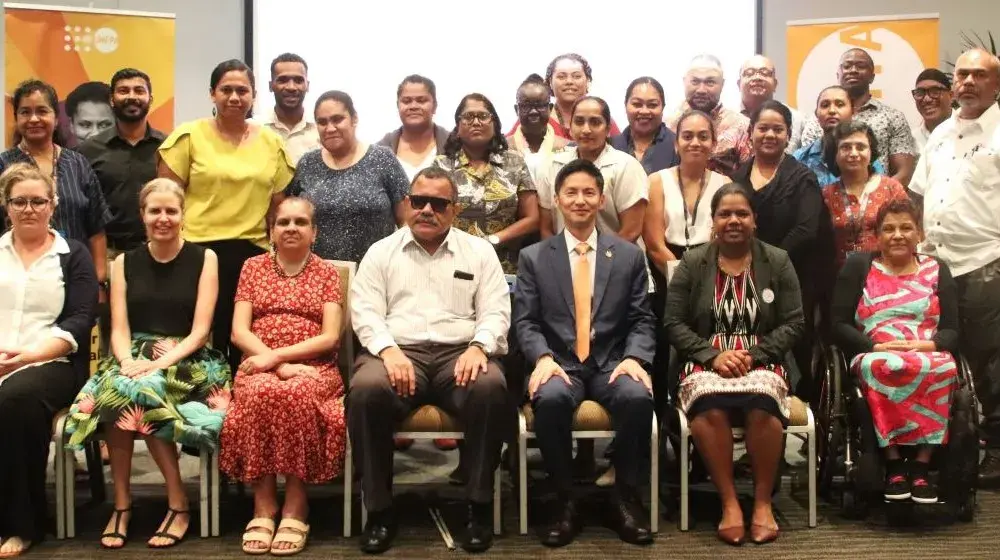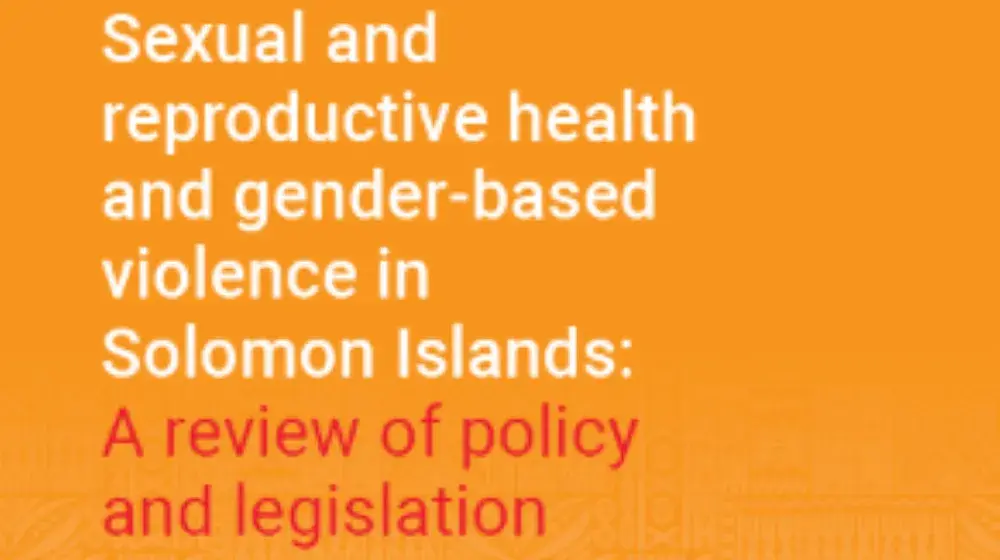Launch of the Solomon Islands’
Health Facility Readiness and Service Availability (HFRSA) Assessment Report, and
the Contraceptive Logistics Management System (CLMS) Standard Operating Procedures (SOP)
02 November 2022, Honiara, Solomon Islands
Honorable Permanent Secretary of Health and Medical Services (supervising), Dr. Nemia Bainivalu,
National Director of Nursing, Mr. Michael Larui, Director of Policy and Planning, Mr. Ivan Ghemu, and other distinguished senior officials from the Ministry of Health and Medical Services, hospitals, and those officials from the provinces,
Distinguished representatives from the Diplomatic Corp, Development Partners, Civil Society, and Non-Governmental Organizations,
My dear colleagues from the United Nations system including WHO, UNICEF and UNFPA,
Good morning to all of you. My name is Iori Kato. I am the Director of the United Nations Population Fund (UNFPA) for the Pacific, usually based in our Sub-Regional Office in Fiji from where we serve 14 Pacific island countries, but Solomon Islands is special because UNFPA also has an in-country office and presence here in Honiara with several staff, led by none other than Ms Alicia Kenilorea present here. When I received an invitation to today’s gathering from the Honorable Permanent Secretary Mme. Pauline McNeil, I was so delighted and excited that I could be part of this event to launch the laudable work done by the esteemed Ministry of Health and Medical Services regarding the Solomon Islands’ Health Facility Readiness and Service Availability Assessment Report, and the Contraceptive Logistics Management System Standard Operating Procedures – for both of which UNFPA had the luxury of providing our support to the Ministry.
I just took up this position as UNFPA Director for the Pacific less than 3 months ago, and this is my very first country visit to this beautiful country, Solomon Islands. And thank you very much for your warm hospitality.
Ladies and Gentlemen,
This year 2022 is a memorable year for all of us – because despite the lingering challenge due to the COVID-19 pandemic, the Ministry has achieved so much, and UNFPA takes a pride in the fact that we have been able to provide support to the Ministry in achieving those results. 2022 is a memorable year for UNFPA as well, because we will be starting a new 5-year Multi Country Programme for 14 Pacific countries including Solomon Island from next year 2023, as the current programme will come to an end this December.
UNFPA is one of some 30 UN agencies working for, and in, these 14 Pacific countries, and within the UN division of labor, UNFPA is mandated to assist our Member States in some specific areas - basically five areas - the first area is the one most relevant to the Ministry of Health and Medical Services, which is sexual and reproductive health including family planning; second is adolescent and youth empowerment including through Family Life Education; third is gender equality especially the eradication of gender-based violence; fourth is population dynamics and demographic data, and the fifth is Humanitarian action. And UNFPA’s interventions under any of these areas are in line with the countries’ development priorities and sector plans like health and education.
UNFPA looks forward to strengthening our partnership with the Ministry in ensuring universal access to quality information and services for sexual and reproductive health, for women and young people. More specifically, UNFPA stands ready to continue to assist the Ministry in addressing all necessary building blocks on the supply side, also with a view to further strengthening resilience of the health system against external shocks such as health pandemics and climate change induced disasters. And these building blocks include: policy framework and institutional capacity development, human resources development, domestic financing, commodity and logistics, enhancing the quality of service delivery, and very importantly, data and evidence. And this is why what we are launching today are so important – both the Health Facility Readiness and Service Availability Assessment Report, and the Contraceptive Logistics Management System SOPs.
As a UN Member State, Solomon Islands is committed to Agenda 2030 including the SDGs, which have the slogans of ‘reaching the furthest behind first’ and ‘leaving no one behind’, and the Ministry also has set out ambitious targets for universal healthcare coverage (UHC) including essential services for sexual and reproductive health. Achieving all these targets will not be possible if without resilient and sustainable health systems, and without access to quality maternal health services and reproductive health commodities which should be available at the right time, right place, right condition, in the right quantities. There cannot be any stock outs or expired stocks of commodities, if we are to leave no one behind. And you cannot ensure all these, without data and evidence, meaning without knowing the status as to exactly where we are, i.e. what we have, where we have those, how many we have, and without knowing what may happen in terms of projection based on trend analysis, and financial costing and budgeting. That is why I emphasized earlier that data is so important, and the Health Facility Readiness and Service Availability (HFSRA) Assessment Report that the Ministry is launching today with UNFPA support, is exactly meant to serve this purpose.
Through our Transformative Agenda Programme funded by Australia’s Department of Foreign Affairs and Trade (DFAT) and technical support from John Snow Inc. (JSI), UNFPA has adapted WHO’s Service Availability and Readiness Assessment (SARA) Tool to develop this Health Facility Readiness and Service Availability Assessment, which has been conducted in 9 countries and territories across the Pacific so far. In Solomon Islands, the HFRSA Assessment was conducted in December 2020. And the report in front of you provides very useful information on the availability and quality of essential maternal health services, as well as the availability of contraceptives and essential medicines.
I would like to acknowledge and pay tribute to the efforts made by the 33 enumerators and field supervisors who travelled all the way to visit 196 health facilities in all 9 provinces in the Solomon Islands, including in the most remote and hardest-to-reach areas. For the first time in this country’s history, the Solomon Islands now has information on key reproductive health services and supply chain indicators, and this has helped to identify areas for further system strengthening, and establish steps for ways forward.
For instance, this assessment done in 2020 identified expired stock in health facilities, based on which the Ministry of Health already took actions in 2021 to clear and replenish the stock, and this has indeed resulted in an increase in the percentage of all secondary health facilities in the country that offer at least 5 modern methods of contraception from 9% to 70%. Through the UNFPA-supported ‘Spot-Checks’ that the Ministry of Health routinely conducts on service delivery points, we also saw an 33% increase in the facilities that offer services for gender-based violence response, from 58% in 2020 to 77% in 2021.
Also in response to another observation from HFRSA that in 2020, less than 10% of facilities consistently maintained stock cards to track Family Planning commodities, the Ministry of Health and Medical Services with UNFPA support is now re-designing and standardizing the stock cards, which will soon be rolled out nationwide. These are just a few examples that demonstrate how the assessment has been useful for the Ministry in targeting its interventions.
In this regard, I would also like to acknowledge the technical support provided by JSI to the Solomon Islands over the last 3 years with the Contraceptive Logistics Management System re-designing process, including development of the SOP, and job aids and training materials for the roll out.
As UNFPA embarks on the new 5-year Multi-Country Programme for 14 Pacific countries including Solomon Islands from next year, I look forward to UNFPA continuing to provide as much support as we can to the Ministry of Health and Medical Services as we strive towards the three zero’s, namely, zero unmet need for family planning, zero maternal deaths, and zero gender based violence, so that no woman and girl in this country needs to be exposed to a risk of unintended pregnancy or preventable maternal death, and to ensure an uninterrupted supply of commodities at all times in every facility, at every level of the health care system.
Congratulations once again, Honorable Permanent Secretary and all distinguished officials of the Ministry of Health and Medical Services, on the launching of these two documents, and thank you very much for letting me be part of this auspicious moment.
Thank you very much.





